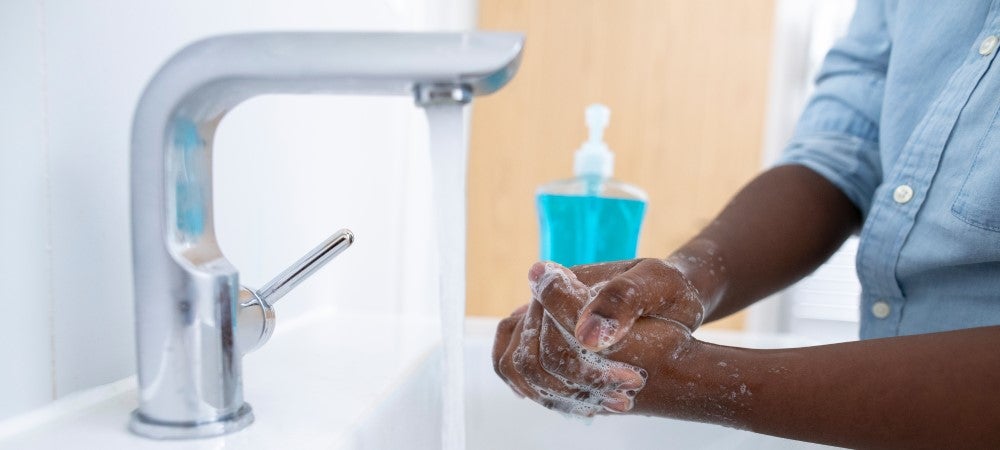Mom knew what she was talking about when she told you to wash your hands all those years ago. She knew that keeping your hands clean is one of the easiest ways to kill germs and keep you healthy. That advice is coming in particularly handy right now, since hand washing is also one of the best ways to limit the spread of COVID-19.
Washing your hands is one thing. Washing them correctly and thoroughly is another. That’s why it’s important to know the best ways to do it. That happens to be one of the Asthma and Allergy Foundation of America’s areas of expertise. Here’s their advice:
Lather Up The Right Way
Even though hand washing seems like a basic task, there actually is a correct way to do it.
- Wet your hands with clean, running water.
- Add soap and rub your hands together to lather the soap. Take care to rub your palms, the backs of your hands, between your fingers and under your fingernails.
- Wash your hands for at least 20 seconds. For fun, sing a song while you wash. You can use the alphabet song, sing “Happy Birthday” twice or pick a personal favorite.
- Rinse your hands well with running water.
- Dry your hands using a clean towel. If no towels are available you can let them air dry, too. Don’t rub them on your clothes or you could get them dirty again.
- Turn off the faucet with your elbow or a paper towel.
When you wash your hands is important, too. Remember to wash:
- After you use the bathroom
- Before eating
- Before preparing food
- After caring for someone who’s sick
- After changing a child’s diaper
- After cleaning or handling trash
- After blowing your nose, sneezing, or coughing
- After touching a frequently touched surface (especially in public areas) including cell phones and computers
Choose The Right Hand Sanitizer
If you can’t wash your hands with soap and water, hand sanitizer is the next best tool – if it’s the right kind. Hand sanitizer should have the right combination of alcohol and strength. Look for a hand sanitizer that contains:
- At least 60% ethyl alcohol (ethanol), or
- At least 70% isopropyl alcohol (isopropanol)
When applying hand sanitizer, rub it on all surfaces of your hands for at least 20 seconds. Let your hands air dry. As suggested above, use a song or another trick to help ensure you rub your hands for long enough to clean them effectively.
Hand Sanitizer Warnings And Recalls
Not all hand sanitizers are created equal. The Food and Drug Administration (FDA) has issued warnings about several harmful brands that came on the market to meet the initial demand created by the coronavirus.
You should avoid brands that contain 1-propanol and methanol (a toxic type of wood alcohol). Neither of these chemicals should not be applied to the skin. Methanol can cause nausea, vomiting, headache, blurred vision and seizures. 1-propanol can cause confusion, decreased consciousness and slowed breathing or pulse. Some products have been found to contain methanol and 1-propanol but are actually labeled ethanol. Many of these have already been recalled, but it’s best to check the FDA website, which has a list of hand sanitizers to avoid, before you buy or use them.
Other Safety Tips For Hand Sanitizer Use
Here are some other safety tips for using hand sanitizer:
- Any hand sanitizer can be harmful if ingested.
- Supervise children when they use it.
- Don't store hand sanitizer in high heat (like in your car).
- Don’t use surface disinfectant wipes to clean your hands, or any part of your body. They can cause irritation on your skin and eyes. Wash your hands after using them to clean surfaces.
Protect Your Skin
All this hand washing and sanitizing can take its toll on your hands, especially if you already have a condition like atopic dermatitis (eczema). The best way to protect your skin is to avoid harsh antiseptic soaps. After washing your hands, pat them dry rather than rubbing them against a towel. It’s also a good idea to apply a moisturizer to your hands after washing and anytime they start to dry out. And if you’re doing extra cleaning these days to keep germs off surfaces, try wearing gloves to protect your hands from the chemicals.
Your mom was right. Proper hand washing is effective in preventing the spread of illness, including COVID-19. And when you combine it with other healthy behaviors like social distancing and mask wearing, you’ve got a very effective strategy for keeping your family safe from the coronavirus and stopping its spread in your community.

